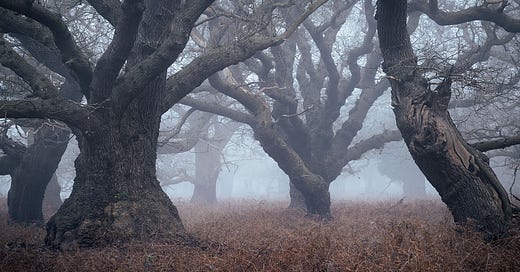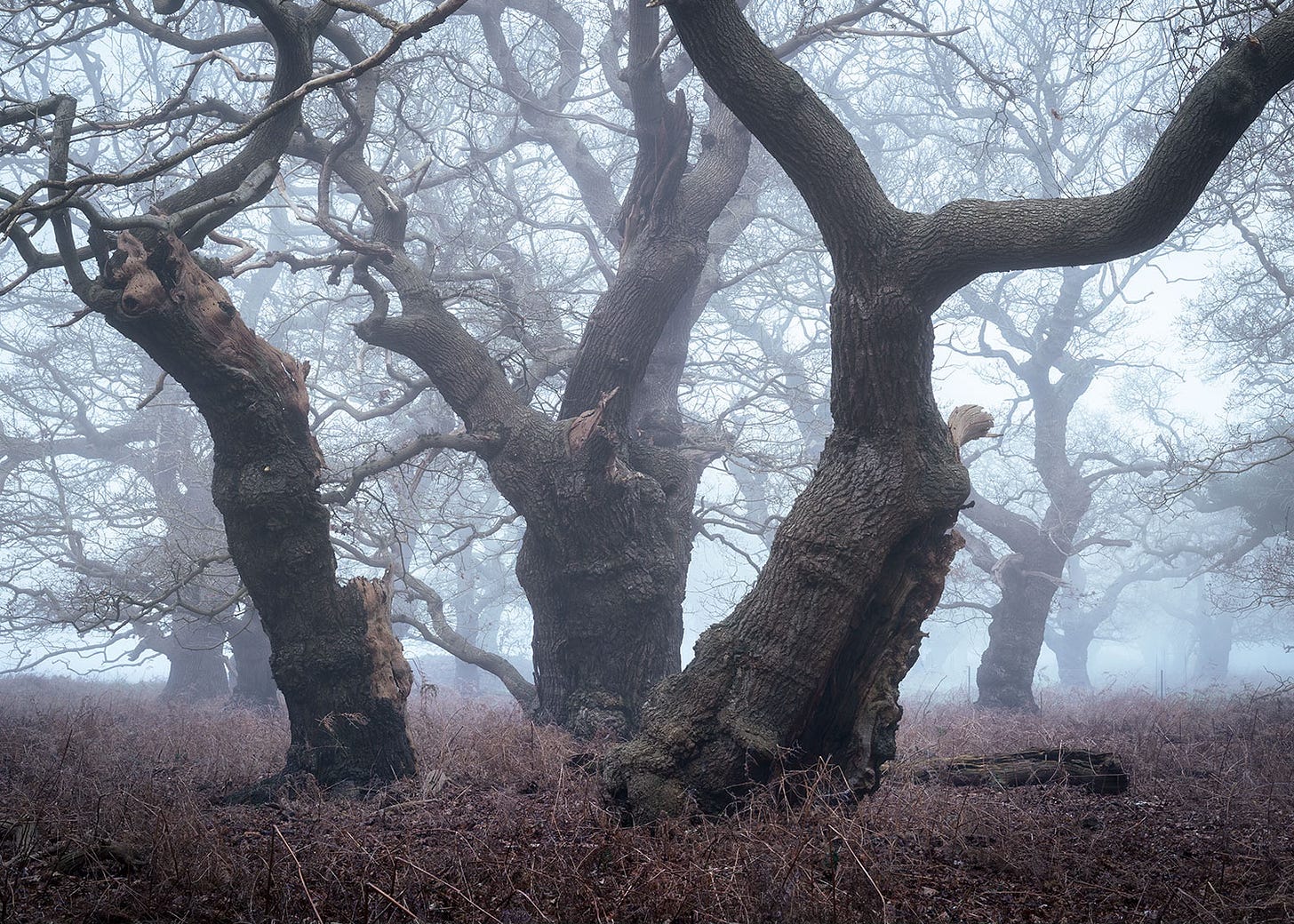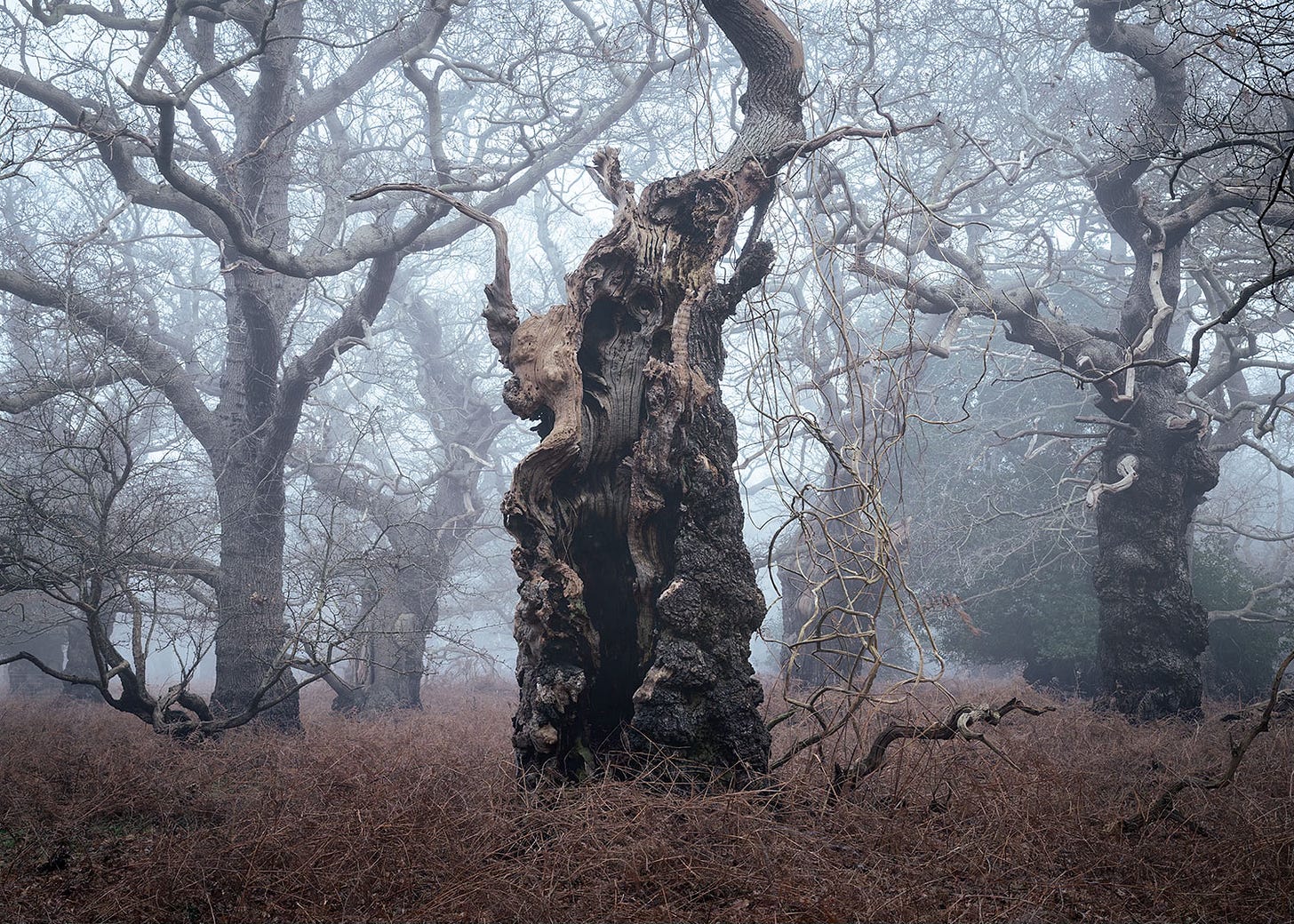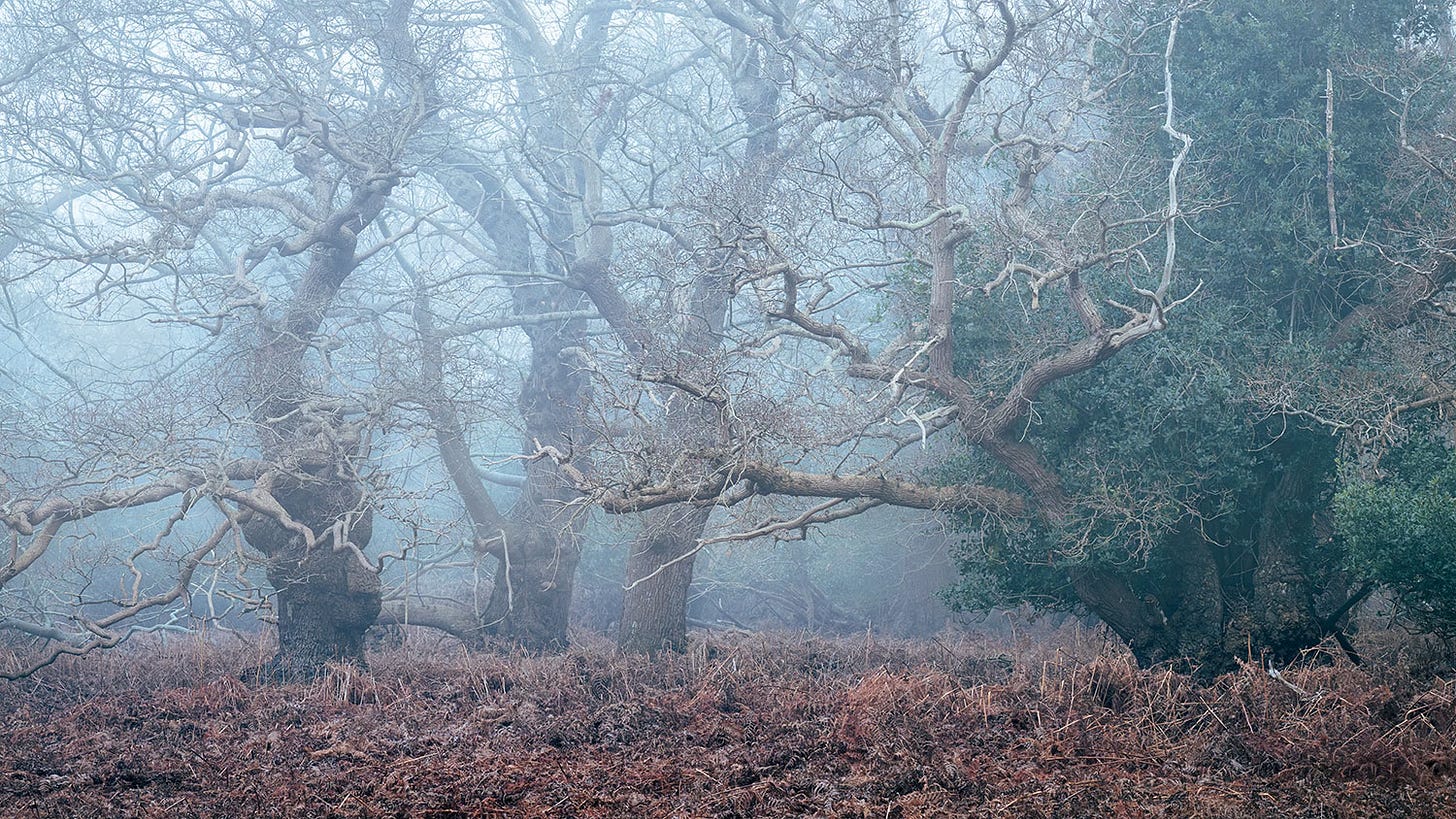Hello, I’m Gill and I write a photography blog inspired by the landscapes of Suffolk and beyond. Please subscribe to read more of my writing and visit my website to view my images.
Fog hangs over the landscape like a blanket. Its consistency so dense I can feel it on my face as I walk. Despite the gloom I am conscious of it enveloping the world, tucking into every corner and crevice as it swirls and moves, shifting in rhythm with the sleeping land as it breaths. Its softness seems to diminish humanities presence and noises that are usually so prominent now seem much quieter.
Stepping off the verge and into the wood the drone of commuter traffic becomes muffled and natural sounds fill the air. I imagine the fog as a filter, removing the worst of human activity, allowing nature to be heard loud and clear once more. Above my head in the moisture laid branches a flock of long tailed tits perform acrobatics with blue tits and great tits, their morning routine just beginning as the light starts to filter through the canopy. There will be no sun today, but the atmosphere and silence is perfect.
I am back in my favourite oak wood. As I move slowly along the path I get the sense I am returning to meet old friends. Gnarly contorted branches sweep forwards in wide embraces, imagined faces stare from hollowed trunks and while this might sound disconcerting the atmosphere is warm and comforting. I feel I am being welcomed by the trees into the heart of their wood.
This is a landscape I care deeply about. It is a location I have visited numerous times and have photographed often. I have told its story in a book and exhibited my images in galleries, but does anyone care about my thoughts or feelings for this place? Do people buy into the photographer or are they just interested in the image?
Last week I was listening to a really interesting podcast with Matt Payne and Marsel van Oosten who, as part of a wider conversation, were discussing AI and reality in photography. During their chat both photographers agreed that the development of AI is moving so fast that within a couple of years we won’t be able to tell whether an image is a real photograph or one that is AI generated. In fact Marcel went on to say that if you are a photographer who is purely driven by the need to produce art then eventually you won’t have to venture out to make images you will be able to do it all from the comfort of your own home. No more travel, no more exploration and no more nature connection.
While this is just an opinion and we can’t possibly know what is going to happen the podcast also brought up the idea that consumers of photography don’t care about the photographer, they just care about the end product.
This got me thinking about my landscape photography and the reasons why I make and share images. Whilst I have always been a bit ambivalent about AI, assuming that it won’t make much difference to me, this podcast actually made me think about the topic a little more seriously.
I found some of the ideas that were voiced deeply worrying, not so much for photography in general but more importantly for the natural world. As a species, humans already have a massive disconnect from nature. We don’t spend enough time in it and many of us don’t understand it. Surely then it follows that if we eliminate reasons to experience it in person we are only going to make this situation worse.
When I was ten I was given my first point and shoot camera. It gave me a reason to explore and it helped me develop my knowledge of nature. I would photograph things, then read about them in books. Visiting different locations, absorbing the sights, sounds and smells and seeing all the wildlife gave me a connection but it also gave me a knowledge of nature that has developed as I have grown.
This connection is something that seems to be missing from so many lives these days. I look at youngsters who can’t identify the most common garden birds or trees and who don’t understand the difference between computer games and reality. Years ago when my son was still at school I took him and a friend canoeing. Before we got into our canoes I asked my son’s friend if he had ever canoed before to which he replied ‘yes, on the Nintendo Wii.’
My heart bleeds for this world we have created where real adventure becomes secondary to artificial experiences played out in closed rooms in front of screens.
Photography might not interest everyone but for me it provides a reason to get out and a voice to communicate my love of nature. If in the future, no one cares and photography becomes yet another activity to experience in front of a screen what will happen to the world around us? Using technology for ‘photography’ that negates the need to get out into the landscape seems detrimental to me on so many levels.
Humans are part of nature, we need to feel part of nature and we need to develop our knowledge of the natural world so that we can pass this on to our children.
AI can never be a substitute for experience. It can never replace the hours spent out in the landscape learning and connecting with the world around us. Ultimately it might be able to create amazing images but without the knowledge to understand what we are looking at I think they become meaningless.
How can we understand all the nuances of the landscape if we never spend any time in it. How can we appreciate the awe of a beautiful sunrise if we have never stood out in nature and seen it with our own eyes. And as viewers of an AI generated image how can we appreciate it if we have no personal experiences to compare it against? Most importantly how can we protect the natural world if we don’t know what it is? If we take away the need for experience we take away the learning that fosters care.
Humans have been story tellers for thousands of years, it is the method by which we pass on our knowledge and traditions. The writings and images we produce are important for our collective understanding of the world in which we live. If in the future no one cares about these and instead of storytelling all we produce is computer generated perfect work with no personal context then how are we supposed to protect this amazing planet that we all rely on for our survival?
As I make my way back through the forest after a morning with my camera I stop to touch the bark of a particularly gnarly old tree. The surface feels hollow, the temperature similar to my own. The bark is dark and wrinkled with age, cracked and torn and covered in cankerous looking swellings which mark the locations of long lost branches. I walk slowly around the circumference and notice several large clefts running the length of the trunk, one so wide I can push my hand inside. As I do, I sense I am reaching back in time to a landscape and way of life I would not recognise. The feeling of connection is powerful. This oak has been old for longer than I have been alive. It has lived through huge changes in the landscape, a growing human population, altered land use, the destruction of natural habitats, global climate change and the loss of native wildlife. It has stood for hundreds of years, a small part of this precious wood, while man has systematically changed the landscape around it. If only trees could speak what message would they impart and what lessons could we learn?
My photography is not AI generated, it is born from my connection with the natural world that I care deeply about. But if you look at my images are you interested in where they came from? Do you care if they are authentic or generated by a machine? Do you care about the photographer, her stories, her knowledge, or the nature that she loves that we have exploited as a species and are now so disconnected from?
As viewers of photographic art are we interested in the photographer, their stories and the knowledge they can impart or are we more concerned with chasing the perfect image however it is produced?
I would be really interested to hear your opinions on this subject so please leave your comments below.
Thank you very much for reading and until next week enjoy your photography.
Gill








Good day Gill, another really interesting blog. I've already seen some what appear to be, fantastic images which have been produced using AI. Indeed, the Chair of my previous camera club demonstrated how easy it was to produce an AI image or enhance an already good photo to make it a 'show-stopper' so I think we're already there if the only part of the process is to produce a brilliant image which is undistinguishable from a photo.
However, as you note and a sentiment with which I totally agree, is that the final photo is almost a 'by-product' of the process. Take this morning for example; we live on the NE Coast of England and I generally go out for a cycle ride around dawn. The forecast wasn't brilliant and looking out I nearly stayed in bed, however, I got togged up, loaded the tripod onto the bike and Put the camera with a flask of coffee into the pannier and set off along the coast. None of my 'go-to' locations promised much in terms of good light, so I just went to an area of rocky beach and set up the camera at the tideline as the waves receded. Not a great composition, not much colour in the sky, so no brilliant images, but I so enjoyed the whole process; the twilight ride there and back, the sound of the waves on the beach and then watching the early morning dog-walkers as I sipped coffee sat on a bench on the prom. I'm sure if I search the web I can generate a prize-winning image of rocks with water swirling around at dawn but I know full well that that wouldn't give anywhere the pleasure I had by going out. Although, I wouldn't get wet feet by doing the latter!
I care deeply that your stunning photographs are real—that you have stood there, walked those paths, touched the bark, and drawn the scent of moss into your lungs. Yet, when I am bound to my desk, wrestling with the confines of an office and the dull ache of cabin fever, your images become a kind of alchemy. On my screen, they conjure places I long to inhabit, landscapes that whisper their siren song. They inspire me to slip free of the everyday and seek the solace of weekend walks in the living world.